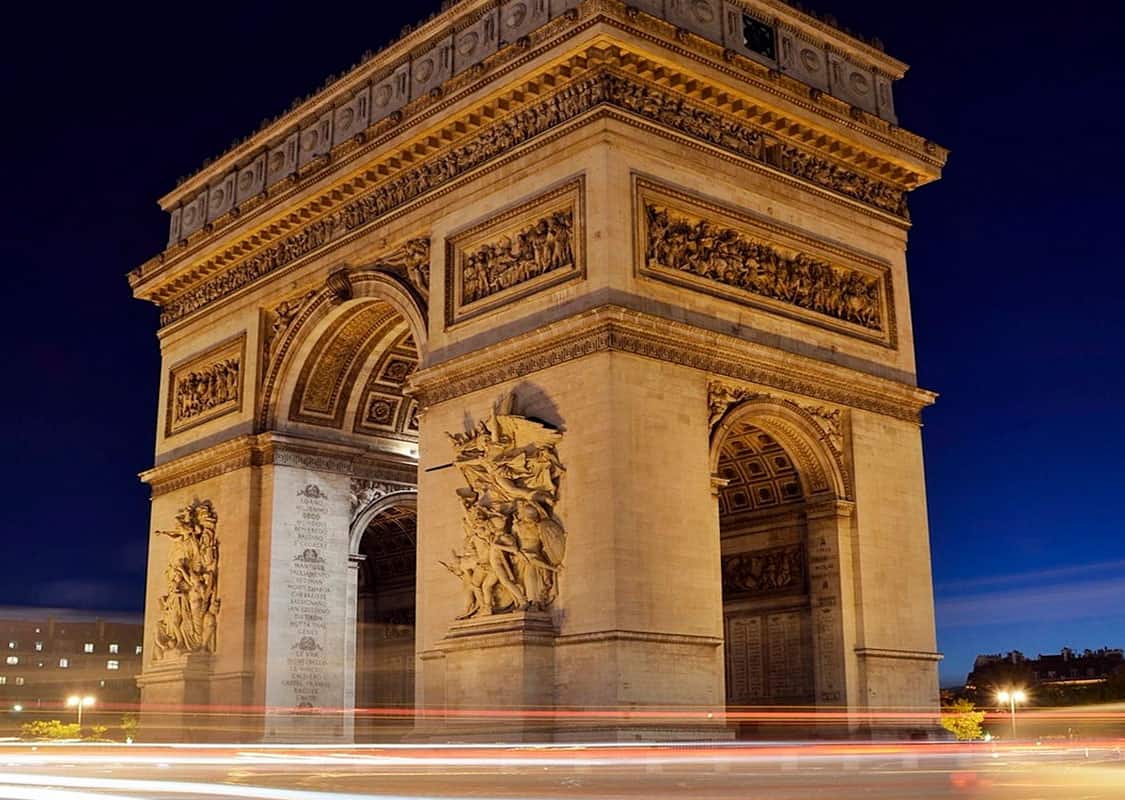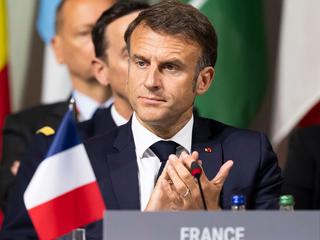Macron risks diminishing Europe, and France within it, by leaving the door open to a party traditionally militantly anti-European …
Spectre of surging far right as France prepares to vote

Marine Le Pen’s concerted attempts at softening her image – she and her cats are a favourite of the social media ‘idiotocracy’ – appear to have borne results.
Chaotic ‘yellow vests’ exposing fragility of France

The anarchic “yellow vests” movement is a disaster for France and a setback for Europe, and it may prove decisive in the advance of European populism.
For an Australian, the iconic sequence turned on the ransacking of the Arc de Triomphe from within. Outside, the flame of the eternal soldier, first lit after the unconscionable carnage of World War I, remained miraculously alight as its dais was pelted by beer bottles.
And yet the nihilism of these fringe hooligans served to evoke the significance of things far greater than small fuel tax rises, now scrapped.
At stake is France facing up to, or yet again not, the challenges of accumulated economic and political problems that have dislocated the nation, discredited the governing class and brought power within reach of populists.
If Emmanuel Macron’s reform project comes undone France may have squandered its last opportunity for substantial reform “in a democratic and peaceful manner”, to quote economic historian Nicolas Baverez.
The signs are not good: France’s quarterly growth forecast has halved in the past six weeks and wiped about €15 billion ($24bn) from the national economy. European elections in May risk becoming merely a referendum on Macron, while a threemonth national “consultancy” will further slow momentum. From here on, any kind of revenue-raising exercise via taxation is going to be hard to sell.
Insurrectionary street politics lies at the heart of France’s DNA. Not just in 1968; in 2005, rioting in the depressed immigrant suburbs of Paris led to 20,000 cars being torched in three weeks. The much publicised Cronulla riots that year led to the “dismantling”, as the Financial Times memorably described it, of 40 vehicles.
But the familiarity of political violence shouldn’t mean minimising its significance. The recalcitrants are right: the French pay too much tax, more than any of their OECD counterparts. Ordinary people are getting desperate. The worry, though, is what that desperation may bring. As things stand, populists are the only political alternative to Macron and his La Republique En Marche party.
The fragility of France’s politics today, with its faltering economic model, make it an open boulevard for populism: the weakness of its informal, as against formal, institutions; the social atomising of its society; the way populist thinking has penetrated the mainstream; the strangeness of France’s ongoing fascination with radicalism of both the Left and Right.
Primed by social media, the yellow vests are a brilliant example of directionless modern agitation in politics. The movement is accurately viewed as populist, but it is a mishmash seeking less tax but more government, participative democracy but strong leaders. It blames problems essentially on the ill will of elites. As Harvard political scientist Yascha Mounk has remarked, many of the yellow vests seem to believe that Macron could change their lives overnight if he wanted. The yellow vests, then, should be read not only as populism but as populism taking greater hold in a country with a kind of creeping sympathy for it.
Before the 2017 presidential elections, the National Front (FN), now rebadged the National Rally, won municipal, European and regional elections, increasing its vote at each poll. FN’s Marine Le Pen came second to Macron — ahead of the main parties — with a record number of votes in both rounds.
The traditional so-called republican front, where other parties call for a final-round vote against the pariahs, worked less efficiently than previously.
And there were major developments: a prominent minor party entered into an electoral agreement with the extremists (Nicolas Dupont-Aignan’s Stand Up France); assorted minor figures of the mainstream Right party, the Republicans, joined the FN between rounds; and a few prominent public intellectuals such as historian Emmanuel Todd and philosopher Michel Onfray, did not call for a vote to block Le Pen.
The most serious faux pas, however, in much of the analysis of the 2017 election was to argue that Macron defeated populism convincingly in the second round. This was taken as evidence that the French will never vote for an extremist in the second round. But they could very well put two populists in the lead in round one.
They almost did. Macron was placed first with 24 per cent, followed by Le Pen on 21.3 per cent and another populist, Jean-Luc Melenchon, a soak-the-rich revolutionary arguing for a 100 per cent top tax rate, scored 19.6 per cent. Add the 7 per cent who voted for various Trotskyist and sovereignty candidates and the first choice of almost half the French voters was a populist.
It’s here that the underlying fragility of French politics is clearest. Never elected, unknown to the general public three years before, Macron staged a veritable revolution at the ballot box. The yellow vests are in a sense his flip side. Who’s to say a figure as confirmed a democrat as Macron might not emerge as quickly? At the moment, though, there’s no one.
How did France’s brilliant young President, Europe’s great reform hope, go so fast from golden boy to the target of blazing insurrectionary violence?
The popularity of French presidents never lasts long; expectations of the new President were uncommonly high, and France’s modern capitalist economy is not working. As always there’s nuance: wealth is more fairly distributed than in the US or Britain, but it comes with chronically low growth, crippling tax, high unemployment and debt, now almost 100 per cent of gross domestic product. The last time the jobless rate dipped below 7 per cent was 1977; the last time the national budget was balanced was 1974.
The welfare state, meanwhile, has become a vastly expensive pipe factory of complexity, mightily hard to fund. France, with 65 million people, has 500,000 more public sector workers than Germany, with 82 million people. What used to be called French corporatism is another problem, with five trade union confederations and often multiple unions across sectors.
Government, audit and think tank reports since at least the mid-1990s have called for similar things: democratising an education system that favours the elite, and a coherent approach to industry when deindustrialisation has been swifter and deeper than elsewhere. Industry is uncompetitive, and low margins and high labour costs undermine the capacity to invest in export industries.
The French crisis carries lessons for all Western democracies. At the barricades, the far Right and far Left have joined forces, united in anger, a probable precursor to future politics if mainstream parties fail to argue the benefits of necessary structural reform.
Historians of Europe may look back on the yellow vests as the moment when populism drew in on the mainstream. Between two-thirds and three-quarters of respondents to one opinion poll said they were sympathetic to the yellow vests, even after the most shocking violence — far higher than the 52 per cent in Britain who voted for Brexit or the 40 per cent in the US generally held to constitute Donald Trump’s base.
The charitable view is not that Macron has dropped the ball but that he is realising the hard way that reform must be undertaken with, and not against, the wishes of the electorate. Who knows? The brilliant 41-year-old may yet renew and reinvent himself.
Pictures: https://www.istockphoto.com/de/fotos/proteste-frankreich?mediatype=photography&phrase=proteste%20frankreich&sort=best
Marine Le Pen’s National Front blunts chance for reform in France

Can the French National Front’s Marine Le Pen win the next French presidential elections in 18 months? Can the leader of an anti-immigrant, anti-Muslim political party — not merely anti-radical-Islamic — take the reigns of one of the world’s great democracies?
The question beckons after historical gains for the far-right National Front in the first round of French regional elections at the weekend. Final results won’t be known until after second-round voting next Sunday, but Ms Le Pen, 47, may be unassailable in the Picardy Nord-Pas-de-Calais region of six million people in the nation’s north. Her niece Marion Marechal Le Pen, 25 — who last month said Muslims could “not truly be French” — was a clear leader, also with 40 per cent of the vote, in the southern region of Provence-Alpes-Cote d’Azur.
According to the French Interior Ministry, the NF was leading after first-round voting in six of 12 newly established mainland administrations with 28 per cent of the vote nationally. Created in 1972, the Front has never governed a French region.
Nord-Picardy is the place of immediate implications for Australia. Under a territorial reform passed by the national parliament last year, the enlarged Nord-Picardy encompasses the French Western Front that includes such historically and spiritually important places for Australians as Villers-Bretonneux, Fromelles, Pozieres and Bullecourt, the sites of key World War I battles.
A victorious Madame Le Pen would be Picardy Nord-Pas-de-Calais Regional Council president, so a requisite invitee to Anzac Day commemorations in the Somme and northern France. French Regional Councils are elected for six years.
The NF’s weekend electoral success completes an impressive triumvirate that began with local council elections last year. The Front won 11 municipalities — trebling its 1995 score — secured a district of Marseilles, the big immigrant city of the south, and two French towns with a population of 50,000 or more (Beziers and Frejus). Two months later, it topped European elections in France, winning 25 per cent of the vote.
Yet the Front’s most high-profile result was in 2002 when founder Jean-Marie Le Pen, a former paratrooper, defeated Socialist candidate Lionel Jospin at the first round of presidential elections. Both sides of politics joined forces, an emboldened electorate rallying in the streets, to carry Jacques Chirac over the line with a Soviet-type score in the second-round run-off.
The cry was jamais encore (never again) but in fact things were better economically in France then than now. In the dozen years since the social problems undoing France have shown no sign of significant improvement. On the contrary. Unemployment has just risen to almost 11 per cent and in the housing-estate suburbs that border most big French cities it is much higher than that. The jihadi attacks in Paris added a new level of anxiety. According to French political scientist Gerard Grunberg, for many voters “there is an Islamic peril in France and we have been too tolerant towards it”.
Meantime, Le Pen, Jean-Marie’s youngest daughter, has had a degree of success in laundering the party’s image. Since taking the leadership four years ago from her father — who referred to the Nazi gas chambers as “a detail” of history — she has shrewdly combined old Left protectionist economic policies with a tough line on immigration. A handful of high-profile defections by newer party officials (frequently of non-French origin) dinted her popularity, claiming that only party window-dressing had changed — at the back of the shop, the Front was still xenophobic and sexist.
But a dent is all that it proved to be. Le Pen fille and the NF were expected to surge in the first electoral test for the French political class since the November 13 terrorist attacks. However, opinion polling has also shown a double-digit jump in approval for Socialist President Francois Hollande.
Security crises usually mean a boost for political incumbents yet the irony of the fillip for Hollande may ultimately help Le Pen. If she can defeat Hollande at the first round of the elections in 2017, she is unlikely to win against a candidate of the mainstream Right in the run-off, be it former president Nicolas Sarkozy or former prime ministers Alain Juppe and Francois Fillon.
However, if Hollande is her opponent and France’s economic fortunes don’t improve, which is likely, it is by no means certain that la France profonde (deep France) would vote to return a centre-left president. This would make Le Pen president of France.
For Australia? How far Le Pen goes is in a sense a secondary consideration. The fact of her rise and rise, and the consequent loss of authority across the centre of French politics, has further blunted the prospects of serious economic reform in France. Sustained incapacity to fix the supply side of the economy, with its overly regulated product and labour markets, risks reducing the appetite of international business for trade liberalisation and investment in Europe’s second-largest economy.
Ms Le Pen is doing damage. The uncomfortable truth is that worse may still be to come.

